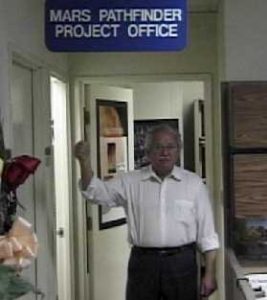Life Cycles of Big, Whacky Ideas

In a recent issue of his blog, Peter Diamandis tells the story of Tony Spear, a NASA jet propulsion expert, who, in 1997, was given the impossible job of engineering the successful landing of a probe on Mars with a budget of only $150 million. A fraction of the $3.5 billion (in 1997 dollars) NASA had spent on the Viking mission in 1976.
One of Spear’s key ideas for getting it done was to use airbags, rather than retrorockets and propulsion systems, to cushion the craft’s landing. It was a novel idea. But the experts, Spear remembers, had two responses to it:
- “Don’t use airbags.”
- “No, we’re totally serious, don’t even consider using airbags.”
“Two of them,” said Spear, “told me flat out that I was wasting government money and should cancel the project. Finally, when they realized I wasn’t going to give up, they decided to dig in and help me.”
Together, they tested more than a dozen designs, skidding them along a faux rocky Martian surface to see which would survive without shredding to pieces.
“In the weeks just prior to landing,” said Spear, “everyone was very nervous, speculating whether we’d have a big splat when we arrived.”
But when the landing was a success, everyone was thrilled. And relieved. And a week later, they claimed to have known, all along, that the airbags would work.
In an essay I posted here last year, I talked about this in terms of some of the novel ideas I’ve promoted in my career. Like Tony Spear’s airbag, many of my ideas were rejected out of hand. But almost all of the criticisms were about challenges and difficulties that could arise. In my book, petty problems that could and would be overcome. But my critics didn’t seem interested in making those ideas work. On the contrary, it was as if they were competing in a game called: Who Can Discount the Idea First?
In The Tipping Point, Malcolm Gladwell explained how big, new ideas go from a spark to a full-blown wildfire. He was writing about all sorts of social phenomena, but it applied perfectly to business. And that’s why I recommend The Tipping Point to anyone interested in starting a business.
Of course, Gladwell is not the only public intellectual to offer a viewpoint on how ideas grow and take hold. In that same issue of his blog, Peter Diamandis points out that Sir Arthur C. Clarke, the inventor of the geostationary communication satellite and author of dozens of bestselling science-fiction books, including 2001: A Space Odyssey, had discussed this problem with him many times. Clarke, he recalled, said all new ideas go through a three-phase acceptance cycle:
- In the beginning, people will tell you that the idea is “crazy” – that it will never work.
- Next, people will say: “Well, it might work but it’s not worth doing.”
- Finally, they’ll say: “I told you that it was a great idea!”
 MarkFord
MarkFord